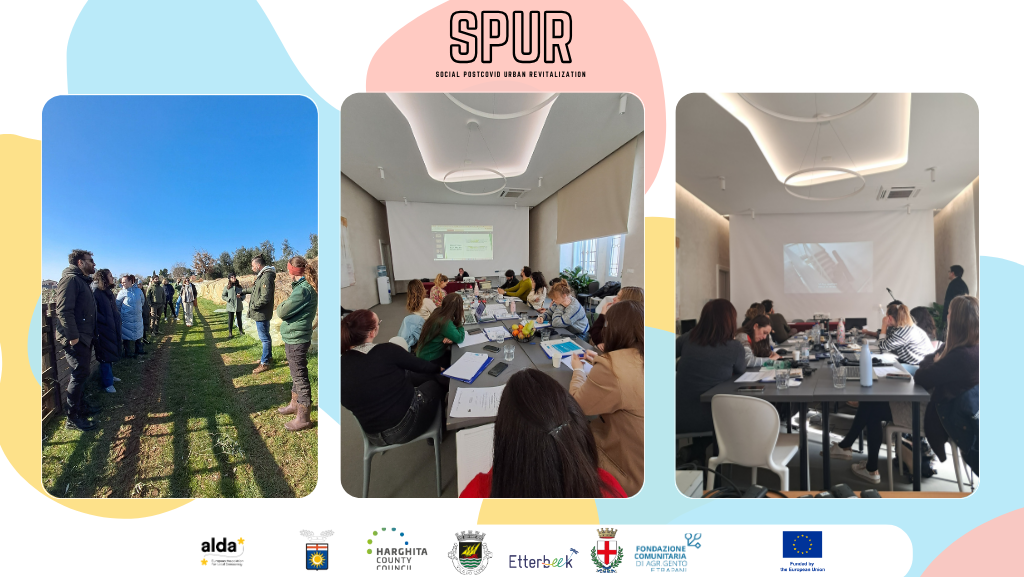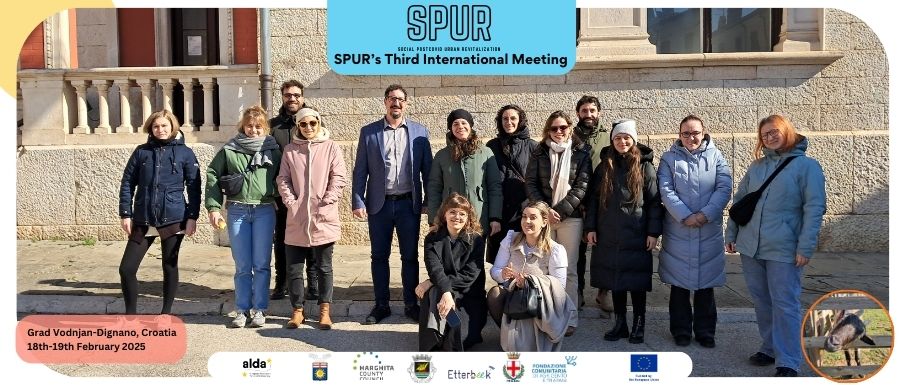On February 18th and 19th, SPUR (Social PostCovid19 Urban Revitalisation) project consortium met in Vodnjan-Dignano, Croatia, to review the outcomes of the co-design processes implemented by partners for their action plans aiming at making cities more resilient and inclusive and to explore innovative crowdfunding models thanks to the trainings provided by Mr. Zoran Rajn and Ms. Sabina Valić.
The first day started with a warm welcome from the Mayor, Mr. Edi Pastrovicchio, who highlighted the importance of projects like SPUR that systematically promote exchanges and discussions between public authorities and citizens, ensuring that cities become concretely more resilient and inclusive for everyone.
SPUR project supports cities in becoming resilient and inclusive for everyone
During the first year of the project, the SPUR project supported the pilot cities (Vodnjan-Dignano (HR), Etterbeek (BE), Città Metropolitana di Milano (IT), Agrigento (IT), Vila do Conde (PT), Harghita County (RO)) in organising focus groups and citizen consultations. These activities aimed at identifying the most urgent challenges, which subsequently served as the foundation for collaboratively designed action plans to address these issues.
“SPUR is a local-based way to put democracy into action”
The rest of the morning was dedicated to exploring the city of Vodnjan-Dignano focusing on its rich history, culture and community initiatives that are revitalising the town. The EcoMuseum and the Didactic Farm are successful initiatives designed to address social challenges such as isolation and social reintegration of marginalised individuals while simultaneously equipping individuals with skills and delivering benefits to the wider community.

In the afternoon, SPUR partners presented the results of the action plans that had been co-developed and co-designed with local citizens, addressing needs identified in previous months, such as impoverished relations, social isolation, social anxiety, which we covered more in depth in our social media channels: Facebook and Instagram. Pilot areas’ main challenge was making initial contact with citizens which was overcome in different ways.
Initiatives such as community gardens, musical events, animated readings, church choirs, and sessions with psychologists were introduced as targeted responses to improve socialisation and to alleviate the isolation experienced by marginalised groups, including the elderly, young people, and migrants.
Pilot areas’ main challenge was making initial contact with citizens
The second day focused on exploring new ways to fund their action plans: the training specifically covered crowdfunding as well as opportunities within the European Solidarity Corps and Erasmus for Young Entrepreneurs. The session was led by Mr. Zoran Rajn, Founder and President of the Centre for Social Innovation and Sustainable Development (CEDIOR) and Executive Director of the International Crowdfunding Centre (ICFC), alongside Ms. Sabina Valić, Project Manager and President of the Association Informo.
Mr. Rajn’s training covered all aspects of developing a crowdfunding campaign, emphasising the importance of choosing the best model of crowdfunding and the time required to plan, implement and deliver the campaign. Additionally, Mr. Rajn provided some tips and best practices regarding what the presentation of a crowdfunding campaign should have to be successful: a catchy title and slogan, an effective storytelling accompanied by coherent visual materials fostering empathy and listing the rewards for funding the campaign.
Ms. Valić focused on the objectives and characteristics of the European Solidarity Corps and Erasmus for Young Entrepreneurs, showcasing the benefit of hosting a young adult as a source for innovation.
Millions of crowdfunding campaigns are launched every year but only a few get funded
To conclude the two-day meeting, the town of Dignano presented its urban and social revitalisation strategy through the “ASTRA” project, an initiative aimed at reimagining the old school by giving it a renewed, sustainable purpose for community benefit.
